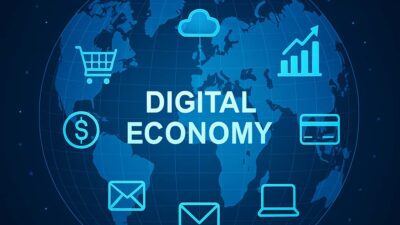Mauritius, a small island nation in the Indian Ocean, has made remarkable strides in transforming its economy from one reliant on agriculture and tourism to a diversified hub for financial services, information technology, and innovation. To sustain this growth trajectory and compete in the global digital economy, Mauritius must prioritize research and development (R&D) and digital innovation. A strategic approach to achieve this is by adopting a knowledge import culture, which involves systematically acquiring, adapting, and integrating global knowledge and expertise into local systems. This article explores how Mauritius can implement such a culture to strengthen its R&D ecosystem, promote digital innovation, and ensure that this strategy complements rather than disrupts the local workforce.
The Case for a Knowledge Import Culture
A knowledge import culture refers to the deliberate effort to access and assimilate external knowledge—through collaborations, technology transfers, talent exchange, and global best practices—while adapting it to local contexts. For Mauritius, this approach is critical for several reasons:
- Limited Domestic R&D Capacity: As a small nation with a population of approximately 1.3 million, Mauritius faces constraints in generating sufficient homegrown R&D due to limited resources, specialized expertise, and research infrastructure. Importing knowledge allows the country to leapfrog these limitations by tapping into global advancements.
- Global Digital Transformation: The rapid pace of digital innovation worldwide, driven by technologies like artificial intelligence (AI), blockchain, and the Internet of Things (IoT), demands that Mauritius stay competitive. A knowledge import culture ensures access to cutting-edge tools and methodologies without reinventing the wheel.
- Economic Diversification: Mauritius has successfully diversified its economy, but sustaining growth requires continuous innovation. By importing knowledge, the country can foster new industries, such as fintech, healthtech, and smart agriculture, aligning with global trends.
- Regional Leadership Ambitions: Mauritius aspires to be a technology and innovation hub for Africa. A knowledge import culture positions it as a gateway for global expertise entering the continent, enhancing its regional influence.
Strategies for Adopting a Knowledge Import Culture
To effectively adopt a knowledge import culture, Mauritius can implement the following strategies, tailored to its unique context:
1. Strengthening International Collaborations
Mauritius can forge partnerships with global universities, research institutions, and technology firms to facilitate knowledge exchange. For example:
- Academic Partnerships: Collaborate with institutions like MIT, Stanford, or IITs in India to offer joint research programs, faculty exchanges, and access to online courses. This would expose local researchers to global best practices.
- Industry Alliances: Partner with tech giants like Google, Microsoft, or Huawei to establish innovation labs or training centers in Mauritius. Such collaborations can bring advanced technologies and expertise to the island.
- Regional Networks: Leverage Mauritius’s membership in organizations like the African Union and COMESA to participate in continent-wide R&D initiatives, sharing and importing knowledge across borders.
2. Attracting Global Talent and Diaspora Engagement
Mauritius can attract international experts and engage its diaspora to transfer knowledge locally:
- Visa and Incentive Programs: Introduce flexible visa policies and tax incentives for foreign researchers, entrepreneurs, and tech professionals to work in Mauritius. The Premium Visa, launched in 2020, is a step in this direction but can be expanded to target R&D professionals.
- Diaspora Networks: Engage the Mauritian diaspora, many of whom work in tech hubs like Silicon Valley or London, to mentor local startups, participate in R&D projects, or invest in innovation ecosystems. Virtual platforms can facilitate this knowledge transfer.
- Reverse Brain Drain: Create opportunities for returning professionals by offering competitive salaries, research grants, and a high quality of life, ensuring their expertise benefits local R&D.
3. Facilitating Technology and Knowledge Transfer
Mauritius can adopt mechanisms to import and adapt technologies to local needs:
- Technology Licensing: Encourage local firms to license advanced technologies from global leaders, adapting them for applications in sectors like agriculture, healthcare, or tourism.
- Open-Source Platforms: Promote the use of open-source software and platforms, which provide cost-effective access to global innovations. For instance, adopting open-source AI frameworks like TensorFlow can accelerate local development.
- Incubators and Accelerators: Establish incubators that connect local startups with global mentors and technologies, ensuring knowledge flows into Mauritius while fostering homegrown innovation.
4. Building Local Capacity to Absorb Knowledge
Importing knowledge is only effective if Mauritius has the capacity to absorb and apply it. This requires:
- Education Reform: Enhance STEM (Science, Technology, Engineering, and Mathematics) education at all levels, emphasizing critical thinking and problem-solving. Introduce coding bootcamps, AI training, and digital literacy programs to prepare the workforce.
- Upskilling Programs: Partner with platforms like Coursera, Udemy, or local institutions to offer continuous learning opportunities for professionals, ensuring they can work with imported technologies.
- Research Infrastructure: Invest in modern laboratories, high-speed internet, and cloud computing resources to enable researchers to utilize global knowledge effectively.
5. Creating a Policy Framework to Support Knowledge Import
Government policies play a pivotal role in enabling a knowledge import culture:
- R&D Incentives: Offer tax breaks, grants, and subsidies for companies investing in R&D, particularly those collaborating with international partners.
- Intellectual Property (IP) Framework: Strengthen IP laws to protect innovations and encourage foreign firms to share knowledge without fear of misuse.
- Public-Private Partnerships (PPPs): Facilitate PPPs to fund R&D initiatives, combining government resources with private sector expertise and global networks.
- Smart Mauritius Vision: Align knowledge import strategies with the government’s Smart Mauritius initiative, which aims to transform the island into a smart, sustainable nation.
Impact on Digital Innovation
A knowledge import culture can significantly enhance Mauritius’s digital innovation ecosystem by:
- Accelerating Technology Adoption: By importing AI, blockchain, or IoT expertise, Mauritius can develop innovative applications, such as smart tourism platforms, digital financial services, or precision agriculture.
- Fostering Startup Growth: Access to global knowledge empowers local startups to create competitive products, attracting investment and creating jobs.
- Enhancing Competitiveness: Knowledge import enables Mauritian firms to adopt global standards, making them more competitive in international markets.
- Promoting Inclusivity: Digital innovations, such as e-health or e-learning platforms, can improve access to services for rural and underserved communities, aligning with Mauritius’s inclusive growth goals.
Why a Knowledge Import Culture Will Not Disrupt the Local Workforce
One concern about importing knowledge is the potential to displace local workers or disrupt existing industries. However, a well-designed knowledge import culture in Mauritius is unlikely to have such effects for the following reasons:
- Complementary Role of Imported Knowledge: The goal is not to replace local expertise but to augment it. Imported knowledge fills gaps in specialized areas (e.g., AI or quantum computing) where local capacity is limited, allowing Mauritian workers to focus on areas where they excel, such as customer service, tourism, or financial operations.
- Upskilling Opportunities: Knowledge import is paired with local capacity-building initiatives, such as training and education programs. This ensures that Mauritian workers acquire new skills to work alongside imported technologies, enhancing their employability rather than threatening it.
- Job Creation through Innovation: By fostering digital innovation, a knowledge import culture creates new industries and job opportunities. For instance, developing fintech or healthtech solutions generates demand for roles like software developers, data analysts, and digital marketers, which can be filled by local talent.
- Focus on Adaptation: Imported knowledge is adapted to local contexts, ensuring it aligns with Mauritius’s cultural, economic, and social realities. This process involves local workers, who play a critical role in customizing solutions, thereby reinforcing their importance.
- Collaborative Approach: Knowledge import emphasizes partnerships between local and global stakeholders. Mauritian workers collaborate with international experts, gaining exposure and experience without being sidelined.
- Economic Resilience: By diversifying the economy through innovation, Mauritius reduces reliance on volatile sectors like tourism, which are prone to global disruptions (e.g., pandemics or climate change). This creates a more stable job market for locals.
- Government Safeguards: Mauritius has a history of proactive labor policies, such as the Workfare Programme, which supports workers during economic transitions. The government can implement similar measures to ensure that knowledge import does not lead to workforce disruption.
Challenges and Mitigation Strategies
While a knowledge import culture offers significant benefits, it comes with challenges that Mauritius must address:
- Challenge: Cost of Implementation
Importing knowledge requires investment in infrastructure, training, and partnerships.
Mitigation: Leverage international funding, such as grants from the World Bank or African Development Bank, and prioritize cost-effective solutions like open-source technologies. - Challenge: Resistance to Change
Local stakeholders may resist foreign expertise due to cultural or economic concerns.
Mitigation: Engage communities through awareness campaigns, highlighting the benefits of knowledge import, and involve local leaders in decision-making. - Challenge: Brain Drain Risk
Exposure to global opportunities may encourage skilled Mauritians to emigrate.
Mitigation: Create attractive local opportunities, such as innovation hubs and competitive salaries, to retain talent. - Challenge: Dependency on External Knowledge
Over-reliance on imported knowledge could stifle local creativity.
Mitigation: Balance knowledge import with investments in homegrown R&D, encouraging local innovation alongside global integration.
Final words
Adopting a knowledge import culture is a transformative strategy for Mauritius to strengthen its R&D ecosystem and drive digital innovation. By leveraging global expertise, technologies, and collaborations, Mauritius can overcome its resource constraints, foster new industries, and position itself as a regional technology hub. Crucially, this approach will not disrupt the local workforce but rather empower it through upskilling, job creation, and collaborative opportunities. With a supportive policy framework, strategic partnerships, and a commitment to local capacity-building, Mauritius can harness the power of global knowledge to build a vibrant, inclusive, and innovative digital future.






I can’t believe how much value you packed into this post. It’s a must-read for anyone in the field.
Thank you! I’m so glad the post was helpful to you.
This post really resonates with me. You’ve perfectly articulated what I’ve been thinking!